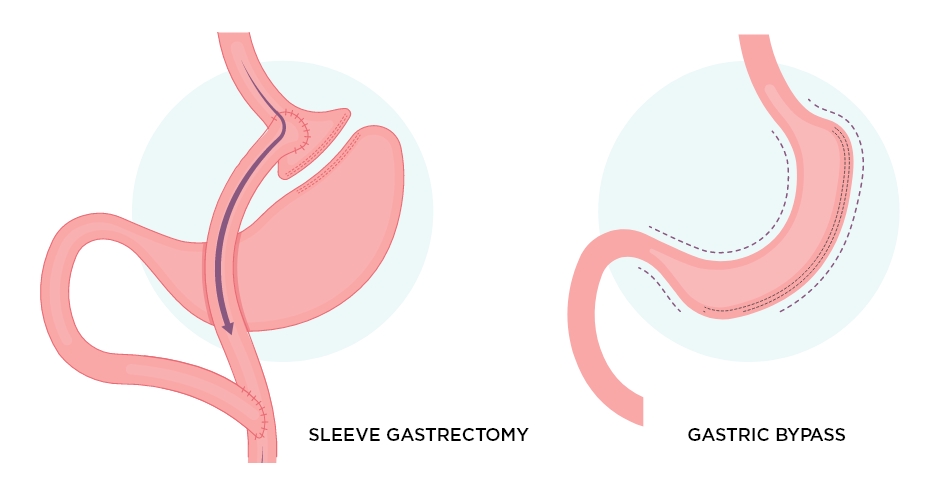
Roux En Y Gastric Bypass
If you are planning for having Roux-en-Y gastric bypass surgery, you are probably looking forward to your new body and learning its benefits in a whole new way. Roux-en-Y surgery helps to lose weight quickly. A splendid surgical treatment that results in vast health benefits is Roux-en-Y. Healthy Türkiye provides you find the best Roux-en-Y specialists in Turkey.
In Turkey Roux-en-Y, gastric bypass is performed as a type of bariatric surgery used to treat severe obesity. It is also the most common bariatric procedure performed in other countries and is considered by some surgeons to be the gold standard of weight-loss surgeries. In Turkey, Roux-en-Y Gastric Bypass is required in the following cases:
Grossly overweight people suffer from co-indispositions like long-standing type 2 diabetes or metabolic syndrome.
Those people who desire to lose more than 50% of their excess weight and then maintain it.
The people who are not only obese but are also suffering from hiatus hernia , severe sleep apnea, Pickwickian Syndrome, Acid reflux, arthritis, severe diabetes mellitus, and high blood pressure.
Roux-En-Y Gastric Bypass Surgery in Turkey
The Roux-En-Y gastric bypass operation is performed in many Turkish clinics. Depending on your recovery, your stay in the hospital can last about four to six days. The special features of your Roux-En-Y gastric bypass depend on your situation and the surgeons’ recommendations.
Some surgeries are performed with large open cuts in the tummy . However, Turkish surgeons perform most Roux-En-Y gastric bypass operations laparoscopically. With this surgery method, the devices are inserted into the abdomen by the surgeon through a few small incisions.

The Principle of Gastric Bypass Surgery
The gastric bypass operation was first described in 1966 by Edward Mason and has undergone many modifications since then. The first laparoscopic gastric bypass surgery was applied by Wittgrove in 1994. The procedure then quickly developed into a standard method for the treatment of obesity.
The method eliminates a large part of the stomach, duodenum, and small intestine from the food passage. After the procedure, the food passes through the esophagus and a small part of the stomach, the so-called stomach pouch, before it reaches the small intestine directly.
How is Roux-en-Y Surgery Performed in Turkey?
In Turkey, Roux-en-Y surgery induces weight loss by restricting the amount of food you can eat and thus, the number of calories that the body can absorb, a process called malabsorption.
During surgery, a small stomach pouch (about the size of a golf ball) is built from the large, existing stomach. This tiny pouch is attached directly to a piece of the small intestine, limiting the kinds of foods that can be eaten and bypassing some of the small intestines, limiting the absorption of what is eaten. The leftover portion of the stomach is left in place to carry digestive juices to the small intestine. Roux-en-Y patients generally require a three-day hospital stay.

How Does Roux-en-Y Surgery Work in Turkey?
First, Roux-en-Y surgery reduces the functional part of your stomach to a small pouch, separating it from the rest with surgical staples. This restricts the amount of food that your stomach can hold. Then, it links the new stomach pouch to a lower segment of your small intestine.
This means when food goes through your digestive system, it will now bypass most of your stomach and the first part of your small intestine. Because of this bypass, your digestive system won’t absorb all of the foods (or calories).
Improved Quality of Life After Surgery
Many obesity is a chronic state that, for many patients, is hard to treat with diet or exercise alone and increases the risks for type 2 diabetes, cardiovascular disease, fatty liver disease, and many other devastating health problems. Bariatric surgical operations, which restrict stomach size and/or alter the intestinal tract, have been increasingly trying to treat severe obesity when other interventions have not worked.
Additionally, Roux-en-Y treatment is performed in clinical practice for people who have milder levels of obesity along with type 2 diabetes or another serious obesity-related disease. These surgical operations can have benefits, such as significant and sustained weight loss, developed control of blood glucose (sugar) levels, or even reversal of type 2 diabetes, especially when accompanied by exercise and a healthy diet habit.
Is Roux En Y Painful?
Based on limited evidence, up to about 30% of patients may have recurrent abdominal pain post-Roux-en-Y gastric bypass in the long term. A substantial subset of patients will need healthcare evaluation for acute abdominal pain and hospital admission. The abdominal pain is heterogeneous and includes gallstone-related disease, intestinal obstruction, anastomotic ulcerations and strictures, intestinal dysmotility, dysfunctional eating, and food intolerance. Surgical operations and guidance on diet and eating habits may allow symptom relief.
Diet After Roux En Y Surgery
You will have healthier eating plan guidelines to follow for several months after your surgery. This is both to protect your digestive system while it heals and to make sure you get the nutrients you need while eating less overall.
You’ll probably start on a liquid diet for the first several weeks. Then gradually progress to a soft diet for several more. It might be two to three months before you return to solid nutrition. When you do, you will have to keep choosing your foods carefully.
Benefits of Roux En Y
Before choosing to have Roux En Y gastric bypass surgery, be sure you understand both the benefits and risks of the operation. When performed laparoscopically, gastric bypass results in less blood loss during surgery, decreased risk of infection, and faster recovery, with less pain.
Roux-en-Y Hepaticojejunostomy
Roux-en-Y hepaticojejunostomy (RYHJ) is considered the definitive treatment for iatrogenic bile duct injuries. It is a common procedure, not only to bypass extrahepatic biliary obstructions. However, it also establishes biliary-enteric continuity after resections for benign and malignant diseases.
Roux-en-Y Gastrojejunostomy
The Roux-en-Y gastrojejunostomy method prohibits postoperative alkaline reflux gastritis or esophagitis after distal gastrectomy. Bile reflux has also been reported to have the potential to cause malignancies in the remnant stomach.
Roux-en-Y Jejunostomy
Roux-en-Y jejunostomy (RYJ) allows enteral feeding in children unable to tolerate oral or intragastric feeds. It prevents many of the complications of nasojejunal and gastrojejunal tubes.
Roux-en-Y Anastomosis
When describing the surgery, the Roux limb is the efferent or antegrade limb that provides the primary recipient of food after the operation, while the hepatobiliary or afferent limb that anastomoses with the biliary system serves as the recipient for biliary secretions. Then travel through the excluded small bowel to the distal anastomosis at the mid jejunum to aid digestion. The altered anatomy may contribute to indigestion following surgery. The operation has also been associated with an increased incidence of iron deficiency anemia, Up to 40% of people have had Roux-en-Y anastomosis.
The Study of Roux-en-Y Gastric Bypass
When describing the surgery, the Roux limb is the efferent or antegrade limb that provides the primary recipient of food after the operation, while the hepatobiliary or afferent limb that anastomoses with the biliary system serves as the recipient for biliary secretions. Then travel through the excluded small bowel to the distal anastomosis at the mid jejunum to aid digestion. The altered anatomy may contribute to indigestion following surgery. The operation has also been associated with an increased incidence of iron deficiency anemia, Up to 40% of people have had Roux-en-Y anastomosis.
Contact US
If you need to know the exact Roux En Y gastric bypass procedure details, Healthy Türkiye offers a free consultation. In Turkey, Healthy Türkiye offers high-quality, specialized, and affordable medical care services.




